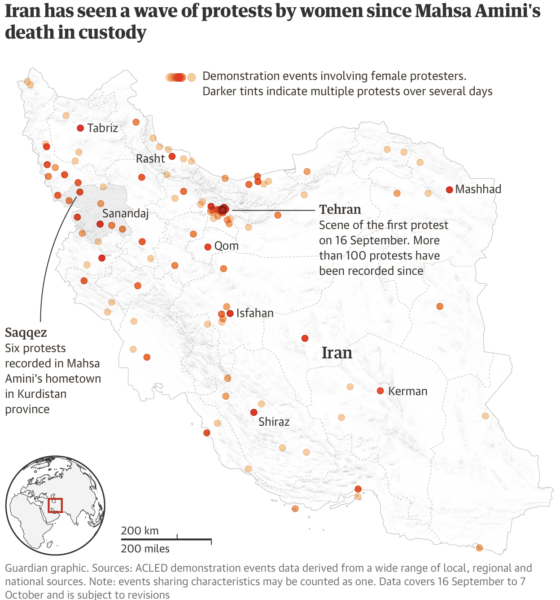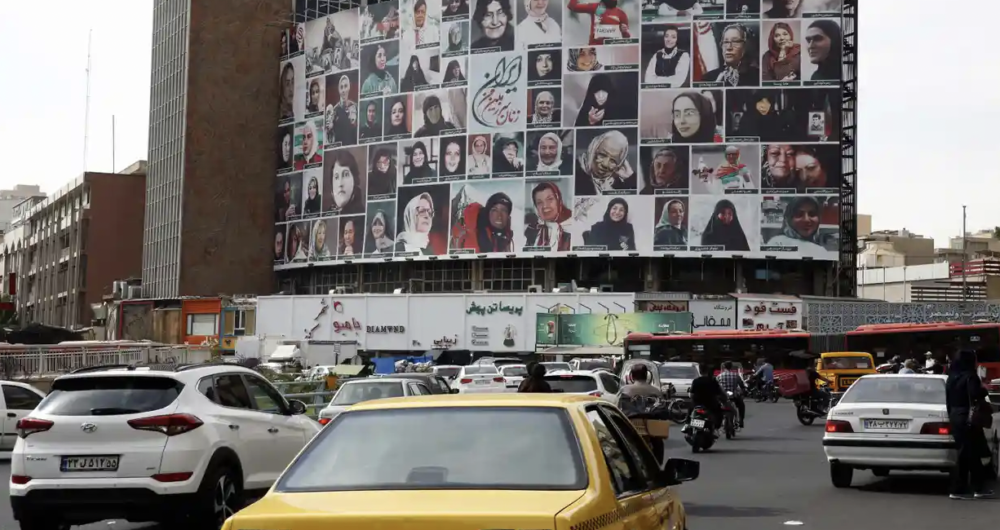At least three of the women depicted in the billboard in Tehran, including the actor Fatemeh Motamed-Arya, voiced their opposition to having their images exploited inappropriately, according to The Guardian.
After notable women and relatives objected to the usage of their images, a montage in Tehran was removed within 24 hours.
When the women on the poster, or their relatives, protested to being portrayed as supporters of the government and the mandatory wearing of the hijab, the Iranian authorities suffered a public relations disaster and were obliged to take down a massive billboard in a prominent Tehran square.
The Islamic Revolutionary Guards Corps-controlled billboard featured a montage of roughly 50 Iranian women wearing the headscarf with the tagline “Women of my Land.” At least three of the women in the image objected to having their image used, and it was removed within 24 hours.
The first person to object was the multi-award-winning actor Fatemeh Motamed-Arya, who made a video. “I am not considered a woman in a place where young toddlers, tiny girls, and freedom-loving youngsters are slain in its fields,” she stated, refusing to wear the hijab.
“I am the mother of Mahsa and Sarina. All the children who were slaughtered in this country have me as their mother. I am the mother of the entire country of Iran, not a lady in the land of murderers,” she continued, making reference to both the 16-year-old Sarina Esmaeilzadeh and the 22-year-old Kurdish woman Mahsa Amini, whose deaths in police custody provoked nationwide demonstrations.
The mountaineer Parvaneh Kazemi and film director Marzieh Boroumand both spoke out against the usage of their images on the billboard shortly after the video was aired.
On her Instagram page, Boroumand penned the following message: “Gentlemen, take my picture down off the wall where you tortured youngsters and teenagers. I will never consent to any group, domestic or foreign, using my cultural identity for their own gain.

She had earlier said, “I cry for Mahsa and for all the ideals that we have lost in the name of religion,” above a photo of Amini.
In a post on Instagram, Kazemi, who has climbed Everest and other summits over 8,000 metres, expressed her rage upon seeing her image on the billboard. It’s unfortunate that abuse is the only purpose for which our names and identities are used.
The late actor Homa Rousta’s son also demanded that the “shameful” usage of his mother’s image be stopped.
“My mother, Homa Rousta, lived with dignity and pride and was surrounded by people throughout her personal and artistic life. Because of the title and name of her father, Reza Rousta, you even suppressed her name for years. Now that she has passed away, you have taken ownership of her image and placed it in a public space where, because of you, I have seen the revolting scene of intimidation and disrespect for men and women every day,” Kaveh Samandarian wrote on Instagram.
Reza Dormishian, a filmmaker and screenwriter, identified the actor from one of his films by name in a tweet. He also identified another image as being of Nooshin Jafari, a photojournalist currently serving a four-year sentence in Evin prison for insulting the government. For more over ten years, radical filmmakers have been in and out of court.
Advertisement
The offending billboard was put back up by the Revolutionary Guards Corps with the same text but no pictures.
The incident highlights how many Iranian athletes and celebrities have shown their support for the protesters, prompting threats from the government that they may face punishment or fines if they do so in the future.
The head of public relations for the Owj Arts and Media Organization, Mehrdad Moazzami, attempted to downplay the conflict by announcing that the poster will be changed and added, “As a media art organisation, we have always taken into mind the unity of dear Iran.”
The images in some of them seem to have been captured from gravestones.
Government supporters said that the poster was removed because it featured an unnamed protester who was suspected of being involved in the violence.




